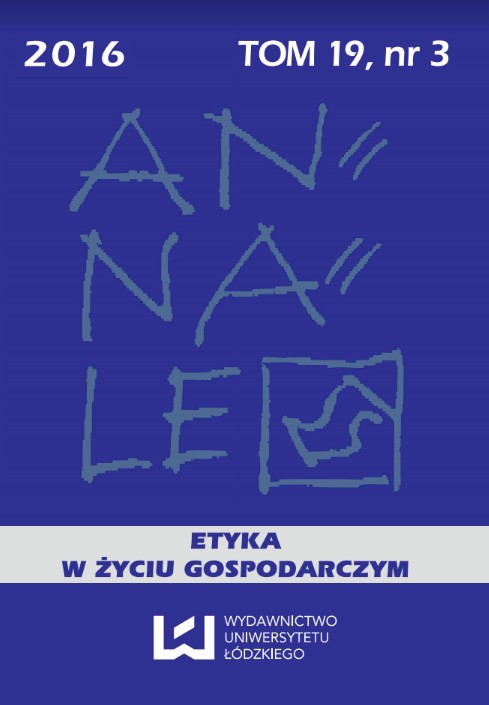Ekonomia personalistyczna jako próba integracji etyki i ekonomii na gruncie idei osoby
DOI:
https://doi.org/10.18778/1899-2226.19.3.05Słowa kluczowe:
personalist economics, ethics, economicsAbstrakt
The aim of the paper is an attempt to show that the personalist economy – by referring to the idea of a person, containing and expressing all the dimensions of being human in relation to the world of people and things – provides the ability to integrate issues of ethics and economics. To achieve this goal, first, the concept of personalist economics will be presented. Then, ideas common for economics and the ethics of space, which can be a basis for integrating their issues, will be identified and characterized. Finally, the author tries to present the consequences which may result from such an integration, both for the economy as a science and as a practice of everyday life.Bibliografia
Argandoña A., Three Ethical Dimensions of the Financial Crisis, IESE Business School – University of Navarra, Working Paper, WP-944, January 2012.
Google Scholar
DOI: https://doi.org/10.2139/ssrn.2079578
Becker G.S., Ekonomiczna teoria zachowań ludzkich, PWN, Warszawa 1990.
Google Scholar
Blaug M., Ugly Currents in Modern Economy, „Options Politiques” 1997, vol. 18, nr 17, September, s. 3–8.
Google Scholar
Davis J.B., Individuals and Identity in Economics, Cambridge University Press, New York 2011.
Google Scholar
Drobny P., Zakaz pracy w niedzielę jako problem granic ekonomii, „Studia Ekonomiczne. Zeszyty Naukowe Uniwersytetu Ekonomicznego w Katowicach” 2015, nr 210, s. 108–117.
Google Scholar
Fine B, D. Milonakis, From Economics Imperialism to Freakonomics, Routledge, London and New York, 2010.
Google Scholar
DOI: https://doi.org/10.4324/9780203880289
Freeman R.E., The Politics of Stakeholder Theory: Some Future Directions, „Business Ethics Quarterly” 1994, vol. 4, nr 4, s. 409–429.
Google Scholar
DOI: https://doi.org/10.2307/3857340
Gneezy U., A. Rustichini, A Fine is a Price, „The Journal of Legal Studies” 2000, vol. 29, nr 1, January, s. 1–17.
Google Scholar
DOI: https://doi.org/10.1086/468061
Heyman J., D. Ariely, Effort for Payment. A Tale of Two Markets, „Psychological Science” 2004, vol. 15, nr 11, November, s. 787–793.
Google Scholar
DOI: https://doi.org/10.1111/j.0956-7976.2004.00757.x
Husserl E., Kryzys nauk europejskich i fenomenologia transcendentalna, Wydawnictwo Rolewski, Toruń 1999.
Google Scholar
Karol Wojtyła. Filozof i papież. Wybór tekstów, red. J. Merecki, Oficyna Naukowa, Warszawa 2009.
Google Scholar
Krąpiec M.A., Człowiek jako osoba, Polskie Towarzystwo Tomasza z Akwinu, Lublin 2005.
Google Scholar
Krąpiec M.A., Osoba ludzka i błędy w jej rozumieniu [w:] Błąd antropologiczny, red. A. Maryniarczyk, K. Stępień, Polskie Towarzystwo Tomasza z Akwinu, Lublin 2003.
Google Scholar
Lawson T., Reorienting Economics, Routledge, New York 2006.
Google Scholar
Mäki U., Realistic Realism about Unrealistic Models [w:] The Oxford Handbook of Philosophy of Economics, red. H. Kinkaid, D. Ross, Oxford University Press, New York 2009.
Google Scholar
DOI: https://doi.org/10.1093/oxfordhb/9780195189254.003.0004
Marshall A., Zasady ekonomiki, Wydawnictwo M. Arcta, Warszawa 1925.
Google Scholar
Paluch A., Malinowski, WP, Warszawa 1981.
Google Scholar
Polanyi K., Wielka transformacja, PWN, Warszawa 2010.
Google Scholar
Sandel M., Czego nie można kupić za pieniądze?, Kurhaus Publishing, Warszawa 2012.
Google Scholar
Snowdon B., H.R. Vane, Rozmowy z wybitnymi ekonomistami, PTE, Dom Wydawniczy Bellona, Warszawa 2003.
Google Scholar
Spaemann R., Kroki poza siebie, Oficyna Naukowa, Warszawa 2012.
Google Scholar
Styczeń T., ABC etyki, Wydawnictwo KUL, Lublin 2010.
Google Scholar
Styczeń T., Etyka jako antropologia normatywna [w:] Wolność w prawdzie, TN KUL i Instytut Jana Pawła II KUL, Lublin 2013.
Google Scholar
Swieżawski S., Święty Tomasz na nowo odczytany, W drodze, Poznań 2002.
Google Scholar
Wojtyła K., Osoba i czyn oraz inne studia antropologiczne, Wydawnictwo Towarzystwa Naukowego KUL, Lublin 2000.
Google Scholar
Pobrania
Opublikowane
Jak cytować
Numer
Dział
Licencja

Utwór dostępny jest na licencji Creative Commons Uznanie autorstwa – Użycie niekomercyjne – Bez utworów zależnych 4.0 Międzynarodowe.









